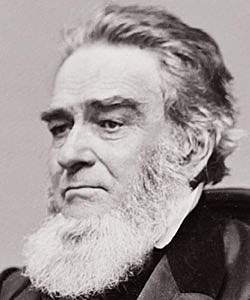Edward Bates (Congressional Biographical Dictionary)
Reference
BATES, Edward, (brother of James Woodson Bates), a Representative from Missouri; born in Belmont, Goochland County, Va., September 4, 1793; attended Charlotte Hall Academy, Maryland; acted as sergeant in a volunteer brigade during the War of 1812; moved to St. Louis, Mo., in 1814; studied law; was admitted to the bar in 1817 and practiced; circuit prosecuting attorney in 1818; member of the State constitutional convention in 1820; State’s attorney in 1820; member of the State house of representatives in 1822; United States district attorney 1821-1826; elected as an Adams to the Twentieth Congress (March 4, 1827-March 3, 1829); unsuccessful candidate for reelection in 1828 to the Twenty-first Congress; resumed the practice of law; member of the State senate in 1830; again a member of the State house of representatives in 1834; declined the appointment as Secretary of War in 1850 in the Cabinet of President Fillmore; judge of the St. Louis land court 1853-1856; presided at the Whig National Convention in 1856; appointed by President Lincoln as Attorney General of the United States and served from March 5, 1861, to September 1864; died in St. Louis, Mo., March 25, 1869; interment in Bellefontaine Cemetery; removed from Bellefontaine Cemetery, place of reinterment not known.
“Bates, Edward,” Biographical Directory of the United States Congress, 1774 to Present, http://bioguide.congress.gov/scripts/biodisplay.pl?index=B000231.





